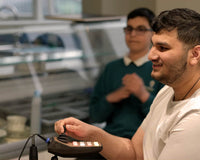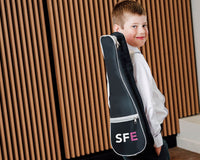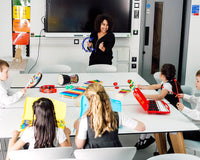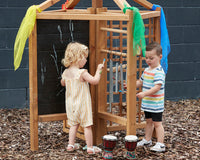Learning how to play
piano, or any instrument, has been shown to increase neural activity and the rate at which the brain make new connections between neurons. There is a growing body of evidence that suggests learning to play the
piano as a child has several cognitive long term benefits in academics and mental health. It is also suggested that learning the
piano teaches useful skills for other areas of life, including discipline, self-esteem and the value of practice.
However, it can be hard to actually get your child to sit down and regularly practice. Learning the piano is a tough task. It takes time and effort that your child may not always be willing to give. So, you may be asking, “How can I get my child to actually want to practice?” Here are a few tips to help make your child more interested in learning the piano.
 Set regular practice times
Set regular practice times
Firstly, one of the best ways to get your child to practice is to make it part of their daily routine. At first, they may not like having a set time to practice. However, over time it becomes part of their ordinary schedule. Once practising has become an ingrained part of the routine, it seems less like extra work and more like a normal daily task, like eating or brushing your teeth.
Have your child play music they like
As a kid, learning old classic piano songs from the likes of Beethoven or Mozart can, frankly, be boring. While there are certainly a standard set of songs that pop up in piano lessons, make sure to let your child pick some of the songs they learn.
According to the Academy of Music and Dance, children start to fully form their personal music preferences around the age of 10/11. These preferences are shaped by radio, TV, and friends. To that end, a good way to motivate your child to practice is letting them learn music they like. The great thing about piano is that pretty much any song can be transcribed to a piano. This means the options are virtually limitless.
 Set goals and give rewards
Set goals and give rewards
Kids, like adults, are often goal orientated. They are more likely to do something you ask if you give them a good reason to do so. One way to motivate them to practice is to dole out rewards. (Sweets and extra gaming time are always a big hit!) The main point is to make sticking to their practice schedule feel less like a chore and more like an achievement.
Have your child play music they like
As a kid, learning old classic piano songs from the likes of Beethoven or Mozart can, frankly, be boring. While there are certainly a standard set of songs that pop up in piano lessons, make sure to let your child pick some of the songs they learn.
According to the Academy of Music and Dance, children start to fully form their personal music preferences around the age of 10/11. These preferences are shaped by radio, TV, and friends. To that end, a good way to motivate your child to practice is letting them learn music they like. The great thing about piano is that pretty much any song can be transcribed to a piano. This means the options are virtually limitless.
 Expose your child to many styles of music
Expose your child to many styles of music
Another way to get your child motivated to practice is to expose them to various different kinds of music. One stumbling block to growing to like the piano is a lack of knowledge about the different genres of music.
To this end, help your child discover what kind of music they like.
This can include:
- Taking them to concerts
- Playing music around the house
- Talking to them about their musical interests
Plan performances
All that practice seems no good if there is nothing to work towards. That is why it is important to schedule regular performances so your child can show off their skills. Planning regular performances has three benefits:
- It gives your child a tangible goal to work towards
- It helps them build confidence by showing their skills off
- They hold your child accountable and increase their discipline
 Consider lessons
Consider lessons
While it is entirely possible to learn piano on your own, sometimes a teacher can help you really get the most out of practice. A good piano instructor will not only teach your child the basics of technique and theory, but also prevent them from developing bad habits. While not a problem initially, bad habits often become an issue as they progress.
Unfortunately, private music lessons can be expensive, but if you have the money, they are a great way to optimise your child’s learning potential. However, you can often find great online resources to help teach your child. For example YouTube is full of great videos and some teachers will do lessons over Skype for a lower rate.
Don’t force it
Unfortunately, learning the piano is not for everyone. If your child has been at it for a while and still just can't get motivated to practice, then maybe the piano just isn’t for them. Don’t be discouraged: Not every child can be a piano virtuoso... It could be they are more of a future
Alison Balsom.
Forcing a child to learn piano when they are just not that interested could cause resentment. This resentment could then spill over to learning any instrument. If it is just not working for your child, let them put down the keys and focus on an activity they enjoy.

Like what you've read from Ian?
You can find more of his work at thrivepiano.com, a piano-centric blog that is filled to the brim with piano info.
 Set regular practice times
Set regular practice times Set goals and give rewards
Set goals and give rewards Expose your child to many styles of music
Expose your child to many styles of music Consider lessons
Consider lessons




















